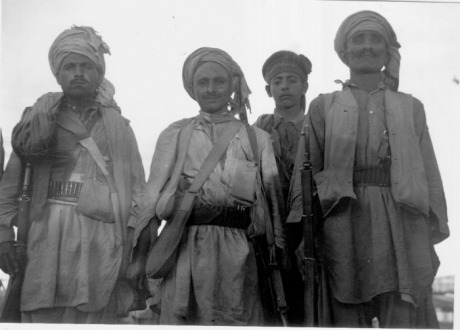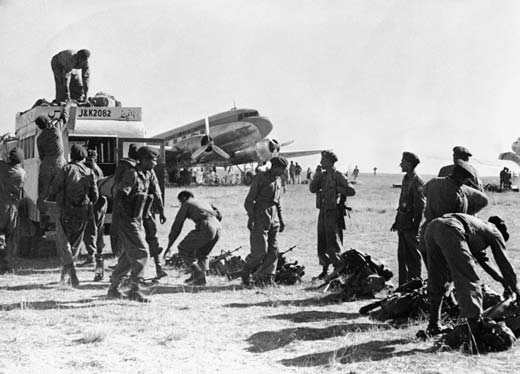By Mehboob Makhdoomi

October reminds us of the October of 1947, which is usually remembered for the entry of Indian forces in Kashmir on its 27th day or 22nd day, when Afridis & Mehsuds entered Kashmir and the controversial ‘Instrument of Accession deed’, between the fleeing Maharajah Hari Singh and the Union of India. This brief chronology of events leads some people to take tribal invasion of October 22nd as the provocation and disturbance of an ‘otherwise hunky-dory situation’. There, certainly, is much more to what meets the eye. Much has been written about accession, its timing and validity; I shall confine this column only to the events up to the tribal invasion.
Pre-1947 India consisted of two components – the British India and the Princely states of India (565 in number). At the time of division of the British India, these princely states were also given a choice to join either of the two dominions. On paper, they also had an option to stay Independent, but in reality it was not to be. All of them decided their political destiny except three – Junagadh, Hyderabad and Jammu & Kashmir (herein referred to as ‘Kashmir’).
In Junagadh and Hyderabad, the Muslim rulers ruled the Hindu majority, while in Kashmir, a Hindu ruler ruled a Muslim majority. If the will of the ruler was paramount, Junagadh and Hyderabad should have either gone to Pakistan or stayed independent; but if will of the people were to prevail, then Kashmir should not have gone to India. It’s simple logic.
However, the will of the rulers of Junagadh and Hyderabad was trashed by Delhi and forces were sent in to annex these territories and rulers incarcerated. This is the background, in which we need to contextualize the events which took place in Kashmir.
Although, I don’t subscribe to the notion that Hari Singh had any right to decide the fate of the people of Kashmir, since he was a tyrant monarch and was at war with his people; but let’s agree to it, for the sake of argument and contemporary legalities and technicalities. Kashmir’s historiography on this issue leaves little doubt about the fact that Hari Singh wished to stay independent or at least flirted with the idea. Had that not been the case, he should have decided to join either of the two dominions well before August 14th, like other princely states. Had he acceded to Pakistan, India wouldn’t have got time to sabotage it and had he acceded to India, Pakistan didn’t even exist to interfere.
The fact that he let go off straight forward options, proves he was either indecisive or wanted to stay independent. Pakistan did not worry about Kashmir, since it was a ‘blank cheque’ in its pocket, in the words of Jinnah. On the contrary, Nehru’s anxiety about Kashmir’s inclusion in India didn’t let him rest, especially the fact that Hari Singh did not like Indian National Congress. Therefore, he decided to come to Kashmir to secure the release of Sheikh Abdullah, who was serving a 3-year jail-term for ‘Quit Kashmir movement’, from 1946.
It’s interesting to learn the importance of Sheikh Abdullah in Nehru’s eyes vis-à-vis Kashmir’s accession to India. However, Lord Mounbatten, the Viceroy of India, objected to his visit and instead offered himself for the job. He came to Kashmir on June 18, 1947 for a 4-day trip.
Hari Singh avoided him to the extent that no proper discussion could take place. At one instance, he even complained of Colic to cancel the meeting. This failed trip was followed by another trip of Mounbatten’s chief of staff Lord Hastlings Ismay, which again failed to make sure that he doesn’t declare independence.
Nehru got infuriated with the outcome and even wrote to Mountbatten, complaining that his endeavours did not bear any results. Unnerved by the impending independence of British India and its division into two states, he once again wanted to go himself, only to be stopped by Sardar Patel this time. He, instead, considered MK Gandhi to be ‘lesser of the two evils’ to go to Kashmir. Campbell Johnson in ‘Mission with Mountbatten’ comments on this anxiety as follows:
“Both Nehru and Gandhi have been very anxious that the maharaja of Kashmir should make no declaration of independence.”
Gandhi came to Kashmir ending July and met Hari Singh on August 1st, (13 days prior to Pakistan’s Independence Day). Although, what transpired in that meeting was not known, but the fact that Father of his Nation, who had never got time to visit Kashmir earlier, left Delhi at such a crucial juncture, to see Hari Singh and influence him about accession, is quite axiomatic. In fact, London Times later reported this on October 25 as follows:
“The Union of India has been taking a lively interest in the subject and indications are that the Hindu Maharaja of Kashmir, Sir Hari Singh, has lately been much influenced by representations made by Gandhi who visited Kashmir three months ago and by other congress leaders.”
Now, if this perception could travel to England, it would’ve been stronger and palpable much earlier in Pakistan. Interestingly, consequences of Gandhi-Singh meet began to send all the wrong signals to Muslim League. Hari Singh was finally influenced and a joint plot began to show results. Just 9 days after this meeting, on August 10, Prime Minister of Kashmir Ram Chander Kak who had no penchant for India, was dismissed and Janak Singh was brought in, who was later replaced by Pro-India Mehr Chand Mahajan.
On August 12, identical telegrams were sent by the Prime Minister of Kashmir to Dominions of India and Pakistan to enter a Standstill agreement, which would have maintained Kashmir’s independence, until a final decision was taken. Pakistan signed it but India refused, making its intentions clear. India’s refusal jolted Pakistan. The main objective of India fructified on September 29, when Sheikh Abdullah was released only after 16 months, even though he was serving a 3-year prison term.

Just after 2 days, on October 2, Abdullah addressed a rally in Hazuribagh saying, “Till the last drop of my blood, I will not believe in Two-nation theory.” The next day, on October 3, 1947, NC working committee met under the presidency of Abdullah and decided to support accession with India, while people’s sentiments could be gauged by the fact that they had smashed windowpanes of Gandhi in Baramulla to protest his visit.
Even Jagmohan in his book ‘My Frozen turbulence in Kashmir’ (pg.83) mentions these two events (replacement of RC Kak & release of Abdullah) and even adds that road link between Jammu and Pathankot was strengthened, a scheme to construct boat bridge over river ‘Ravi’, but says he doesn’t see anything wrong in it. Also, a Telegraph line was initiated between Jammu and Valley.
Then, under the influence of Mountbatten, the chairman of the boundary commission Sir Cyril Radcliffe awarded the only Muslim majority district-Gurdaspur to India, which was India’s only road link with Kashmir. The British author, Alastair Lamb, points to the presence of Patiala troops (Indian forces) in Kashmir, well before October 22; and I was amazed to see Jagmohan in his book not denying this, by justifying it saying “Maharajah in Kashmir was not precluded from obtaining troops from wherever he liked’’.(Pg 821)
Then, there was a popular rebellion against Hari Singh in Poonch, which was being inhumanely quelled by the authorities. The Muslims from the other side wanted to join people. Since Pakistan had already signed the stand-still agreement with Hari Singh, it could not have entered its troops, like India did in Hyderabad and Junagadh.
This is why it could be believed that Pakistan facilitated the tribals and volunteers, to invade Kashmir, although some historians opine that Government of Pakistan was unaware, saying stress circumstances were created for Hari Singh by India and the tribal raid was engineered.
Interestingly Army Chief of both the countries of Pakistan and India were British officers. They say that there seems to have been some understanding between the two chiefs. As mentioned by Devi Dass in his book “Kashmir in search of future”, the Indian army Chief knew three days in advance about tribal raid.
Whether Devi Dass is right or not, India was vigorously pursuing to annex Kashmir; and tribal raid, to my belief, was not the reason for accession. New Delhi had already made inroads in Kashmir and would have annexed it anyways.
 (Mehboob Makhdoomi is a Harvardian & an MBA from Pennsylvania University (IUP) the United States with a Research degree from Cardiff University, United Kingdom. Views expressed in this article are the author’s own.)
(Mehboob Makhdoomi is a Harvardian & an MBA from Pennsylvania University (IUP) the United States with a Research degree from Cardiff University, United Kingdom. Views expressed in this article are the author’s own.)
















Nehru succeded where Jinnha failed.Nehru love his homeland kashmire and Kashmiri.His athnic bond with kashmiris in particular witj Sheikh Abdullah suceeded while as Jinnah could not usehis religion card in Kashmir.ethnicity overpowered the communal staance of Jinnah.Rest is history which no one knows cpmpleatly.
The author forgets that Partition “rules” also mandate contiguity, and neither Hyderabad not Junagarh has contiguity to Pakistan. Nehru got himself into a major bind from which he could not escape when he brought up the matter of the will of the people. We may agree that Sheikh Abdullah did not have the consent of the people to join India. Nehru should have stuck to a single point: The Partition rules say nothing of the will of the people, but the will of the ruler. After Nehru, of course, India’s position is 10/10th of the law.
Please note that Pakistan had no interest in the will of the people in Gilgit/Baltistan, which was for independence. Or of East Pakistan. Legally Pakistan was right because the partition agreements specifically rules out Independence.
Now, what do I mean the “Partition rules”? I am not an expert, but AFAIK, the Partition of Indian Act as originally passed by LOndin ALLOWED independence those princely states who wanted it. But in practice, British Government have Mountbatten considerable leeway to decide on specific issues. AFAIK, Mountbatten (perhaps influenced by Nehru) did not want the Balkanization of India. Also Mountbatten impressed on Nehru the need to ascertain the will of the Kashmiri people, and Nehru agreed. That’s where the plebiscite thing comes from, whereas no other kingdom had a plebiscite.
I dont blame Pakistan – or -India -for grabbing Kashmir. But the state has proved a poisoned chalice for both and created an endless misery.